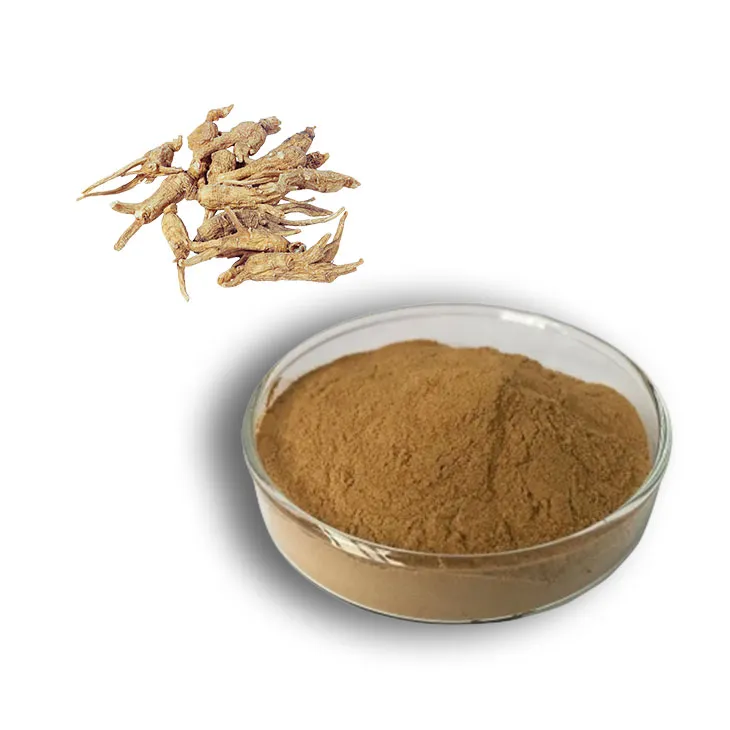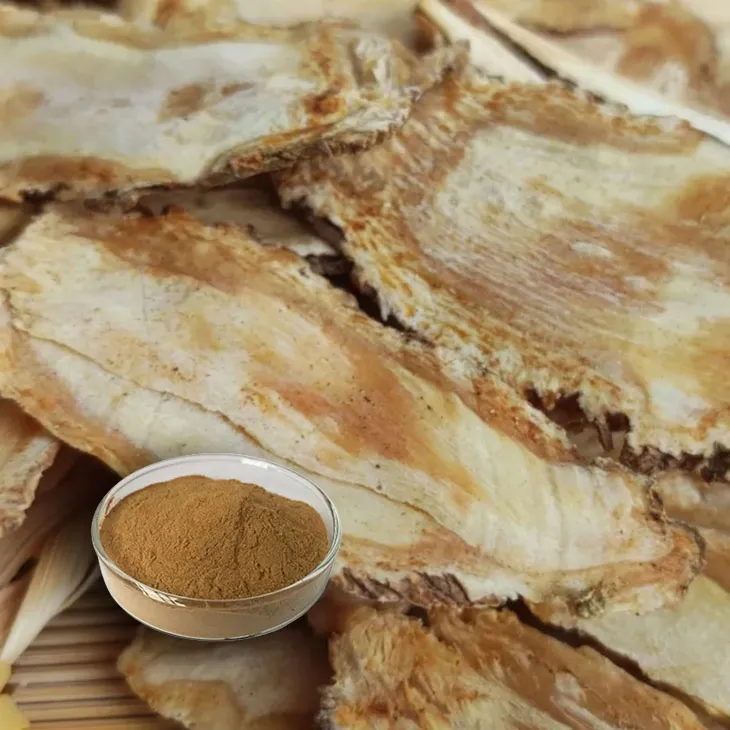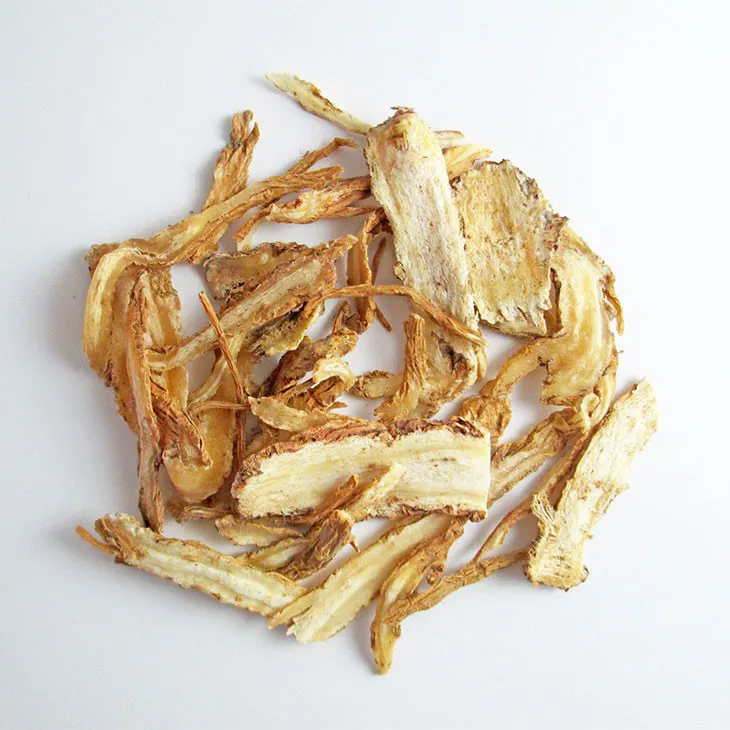- 0086-571-85302990
- sales@greenskybio.com
Use Angelica sinensis extract to prevent diseases and enhance immunity.
2024-11-13

1. Introduction
Angelica sinensis, also known as Dong Quai, is a well - known herb in traditional Chinese medicine. Angelica sinensis extract has been used for centuries due to its various potential health benefits. In modern times, scientific research has been exploring its role in preventing diseases and enhancing immunity. This article aims to delve into the mechanisms behind these effects, as well as its traditional and modern applications.

2. Traditional Use of Angelica Sinensis
2.1 In Chinese Medicine
In traditional Chinese medicine, Angelica sinensis has been highly regarded. It is often used to regulate menstrual function in women. For example, it is used to relieve menstrual pain, irregular menstruation, and menopausal symptoms. It is believed to have a nourishing effect on the blood, which is considered essential for overall health.2.2 Other Traditional Uses
In addition to its use in gynecological conditions, Angelica sinensis has also been used in traditional medicine for treating anemia. It was thought to help improve the quality of blood and increase the body's vitality. It was also sometimes used to relieve symptoms of constipation due to its potential to moisten the intestines.
3. Composition of Angelica sinensis extract
Angelica sinensis extract contains a variety of active components. One of the most important is ferulic acid. Ferulic acid is a phenolic compound that has antioxidant properties. It can scavenge free radicals in the body, which are often associated with cell damage and various diseases. Another significant component is ligustilide. Ligustilide has been shown to have anti - inflammatory effects. There are also other components such as polysaccharides, which may play a role in modulating the immune system.

4. Mechanisms in Disease Prevention
4.1 Antioxidant Activity
The antioxidant activity of Angelica sinensis extract is crucial in disease prevention. Free radicals are constantly generated in our bodies through normal metabolic processes as well as exposure to environmental factors such as pollution and radiation. These free radicals can cause oxidative stress, which is linked to many diseases including cancer, cardiovascular diseases, and neurodegenerative diseases. The ferulic acid and other antioxidant components in Angelica sinensis extract can neutralize these free radicals. For example, ferulic acid can donate an electron to the free radical, thereby stabilizing it and preventing it from causing further damage to cells.4.2 Anti - inflammatory Effects
Chronic inflammation is another factor that contributes to the development of many diseases. The ligustilide in Angelica sinensis extract has anti - inflammatory properties. It can inhibit the production of inflammatory mediators such as cytokines and prostaglandins. By reducing inflammation, the extract may help prevent diseases such as arthritis, inflammatory bowel disease, and some skin diseases.4.3 Regulation of the Immune System
The polysaccharides in Angelica sinensis extract may play a role in regulating the immune system. A well - regulated immune system is essential for preventing infections. These polysaccharides can stimulate the production of immune cells such as macrophages and lymphocytes. Macrophages are responsible for engulfing and destroying foreign invaders such as bacteria and viruses, while lymphocytes play a crucial role in the adaptive immune response. By enhancing the function of these immune cells, Angelica sinensis extract can help the body better defend against diseases.5. Modern Applications in Disease Prevention
5.1 Cardiovascular Health
In the context of cardiovascular health, Angelica sinensis extract may help in several ways. Its antioxidant properties can protect the blood vessels from oxidative damage. Oxidative damage to blood vessels can lead to the formation of atherosclerotic plaques, which increase the risk of heart attacks and strokes. Additionally, some studies suggest that the extract may have a mild blood - pressure - lowering effect. It may also help in reducing blood lipid levels, such as cholesterol and triglycerides.5.2 Cancer Prevention
Although more research is needed, there are some indications that Angelica sinensis extract may have potential in cancer prevention. Its antioxidant and anti - inflammatory effects may play a role. For example, by reducing oxidative stress and inflammation, it may help prevent the initiation and progression of cancer cells. Some in - vitro and animal studies have shown that certain components of the extract can inhibit the growth of cancer cells, but human clinical trials are still limited.5.3 Neurological Health
For neurological health, the antioxidant activity of the extract may be beneficial. Oxidative stress is implicated in neurodegenerative diseases such as Alzheimer's and Parkinson's disease. By scavenging free radicals, Angelica sinensis extract may help protect the neurons from damage. Additionally, some studies suggest that it may have a role in improving cognitive function, although the exact mechanisms are not fully understood.6. Enhancing Immunity with Angelica Sinensis Extract
6.1 Stimulation of Immune Cells
As mentioned earlier, the polysaccharides in Angelica sinensis extract can stimulate the production of immune cells. Macrophages, when activated by the extract, can better phagocytize pathogens. Lymphocytes, including T - cells and B - cells, can also be enhanced in their function. T - cells are involved in cell - mediated immunity, while B - cells are responsible for antibody production. By increasing the number and function of these immune cells, the body's overall immunity is strengthened.6.2 Modulation of the Immune Response
Angelica sinensis extract can also modulate the immune response. In some cases, the immune system may overreact, leading to autoimmune diseases. The extract may help to balance the immune response, preventing excessive immune reactions. On the other hand, in cases of immune deficiency, it can boost the immune system to a normal level.7. Dosage and Safety Considerations
7.1 Dosage
The appropriate dosage of Angelica sinensis extract can vary depending on the form of the extract (e.g., tincture, capsule, powder) and the intended use. In general, for general health maintenance, a relatively low dose may be sufficient. However, for treating specific conditions, higher doses may be required under the guidance of a healthcare professional. For example, in traditional Chinese medicine, when using Angelica sinensis for menstrual problems, the dosage is carefully adjusted according to the individual's condition.7.2 Safety
While Angelica sinensis extract is generally considered safe for most people when used appropriately, there are some safety considerations. Some people may be allergic to Angelica sinensis. Also, during pregnancy, high doses of Angelica sinensis should be avoided as it may have effects on the uterus. Additionally, when taking Angelica sinensis extract with other medications, there may be potential interactions. For example, it may interact with blood - thinning medications, so it is important to consult a doctor before starting to use the extract.8. Conclusion
Angelica sinensis extract has a long history of traditional use and shows potential in modern scientific research for preventing diseases and enhancing immunity. Its antioxidant, anti - inflammatory, and immune - modulating properties make it a promising natural agent. However, more research is still needed, especially in the form of large - scale human clinical trials, to fully understand its efficacy and safety. With proper dosage and under the guidance of healthcare professionals, Angelica sinensis extract may be a valuable addition to strategies for maintaining health and preventing diseases.
FAQ:
What is Angelica Sinensis extract?
Angelica Sinensis extract is a substance derived from the Angelica Sinensis plant. It contains various bioactive compounds such as ferulic acid, ligustilide, etc. These compounds contribute to its potential health - promoting properties.
How does Angelica Sinensis extract prevent diseases?
It has antioxidant properties that can neutralize free radicals in the body, reducing oxidative stress which is associated with many diseases. Also, it may have anti - inflammatory effects, which can help prevent chronic inflammatory - related diseases. Some of its components may also interact with the body's cells and immune system to enhance the body's natural defense mechanisms against pathogens.
Can Angelica Sinensis extract really enhance immunity?
Yes, it can. It may stimulate the activity of immune cells like macrophages and lymphocytes. By enhancing the function of these immune cells, the body is better able to recognize and fight off foreign invaders such as bacteria, viruses, and fungi, thus enhancing the overall immunity.
Are there any side effects of using Angelica Sinensis extract?
When used properly, Angelica Sinensis extract is generally considered safe for most people. However, in some cases, it may cause mild side effects such as gastrointestinal discomfort, including nausea or diarrhea. Pregnant women should be cautious as it may have hormonal effects. People with bleeding disorders should also consult a doctor before use, as it may increase the risk of bleeding.
How is Angelica Sinensis extract used?
It can be used in various forms. It is available as dietary supplements in capsules or tablets. In traditional medicine, it may also be used in decoctions or tinctures. However, it is important to follow the recommended dosage instructions provided by manufacturers or healthcare providers.
Related literature
- The Pharmacological Effects of Angelica Sinensis Extract on Health"
- "Angelica Sinensis Extract: Traditional and Modern Perspectives in Disease Prevention"
- "Immunomodulatory Effects of Angelica Sinensis"
- ▶ Hesperidin
- ▶ citrus bioflavonoids
- ▶ plant extract
- ▶ lycopene
- ▶ Diosmin
- ▶ Grape seed extract
- ▶ Sea buckthorn Juice Powder
- ▶ Beetroot powder
- ▶ Hops Extract
- ▶ Artichoke Extract
- ▶ Reishi mushroom extract
- ▶ Astaxanthin
- ▶ Green Tea Extract
- ▶ Curcumin Extract
- ▶ Horse Chestnut Extract
- ▶ Other Problems
- ▶ Boswellia Serrata Extract
- ▶ Resveratrol Extract
- ▶ Marigold Extract
- ▶ Grape Leaf Extract
- ▶ blog3
- ▶ blog4
- ▶ blog5
-
Organic Tongkat Ali extract powder factory.
2024-11-13
-
How to make powder with ashwagandha extract.
2024-11-13
-
Rosehip extract manufacturers from China.
2024-11-13
-
The best cat's claw extract in nature.
2024-11-13
-
Chinese Dandelion Leaf Extract Suppliers.
2024-11-13
-
Baicalin
2024-11-13
-
Beetroot Powder
2024-11-13
-
Tongkat Ali Extract Powder
2024-11-13
-
Rose Hip Extract
2024-11-13
-
Nettle leaf extract
2024-11-13
-
Lemon Extract
2024-11-13
-
Curcuma Longa Extract
2024-11-13
-
Cassia Seed Extract
2024-11-13
-
Tinospora cordifolia extract
2024-11-13
-
Almond Extract Powder
2024-11-13





















